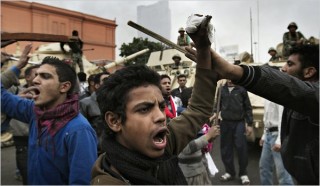 Broad-based protests continue today as Zionist forces try to marginalize Islamic resistance to the oppression
Broad-based protests continue today as Zionist forces try to marginalize Islamic resistance to the oppression
By DAVID D. KIRKPATRICK, KAREEM FAHIM and ETHAN BRONNER
CAIRO — Egypt was engulfed in a fifth day of protests on Saturday but an attempt by President Hosni Mubarak to salvage his 30-year rule by firing his cabinet and calling out the army appeared to backfire as troops and demonstrators fraternized and called for the president himself to resign.
While some protesters clashed with police, army tanks expected to disperse the crowds in central Cairo and in the northern city of Alexandria instead became rest points and even, on occasion, part of the protests as anti-Mubarak graffiti were scrawled on them without interference from soldiers.
“Leave Hosni, you, your son and your corrupted party!” declared the graffiti on one tank as soldiers invited demonstrators to climb aboard and have their photographs taken with them.
“This is the revolution of all the people,” declared the side of a second tank in downtown Cairo. Egyptian men all serve in the army, giving it a very different relationship to the people from that of the police.
The feared security police had largely withdrawn from central Cairo to take up positions around the presidential palace, with their places taken up by the army.
Following Mr. Mubarak’s demand in his late-night speech, the Egyptian cabinet officially resigned on Saturday. But there was no sign of letup in the tumult. Reports from morgues and hospitals suggested that at least 50 people had been killed so far.
In Ramses Square in central Cairo Saturday midday, protesters commandeered a flatbed army truck. One protester was driving the truck around the square while a dozen others on the back were chanting for President Mubarak to leave office. Nearby, soldiers relaxed around their tanks and armored vehicles and chatted with protestors. There were no policemen in sight.
In another sign that the army — in which every man has to serve — was showing sympathy for the demonstrations, in a different central Cairo square on Saturday a soldier in camouflage addressed a crowd through a bullhorn declaring that the army would stand with the people.
“I don’t care what happens,” the soldier said. “You are the ones who are going to make the change.” The crowd responded, “The army and the people will purify the country.”
Workers at the Alexandria morgue said they had counted more than 20 bodies from the last 24 hours of violence. Meanwhile, protests had started up again in the city. But there too, the demonstrators and the soldiers showed sympathy for one another. Demonstrators brought tea to the troops and had their pictures taken with them. Protesters walked by armored carriers unmolested with few signs of animosity. People gathered outside the morgue looking for their relatives. In the main hospital, there were a number of people lying wounded from live fire.
Cell phone service, cut off by the government on Friday, was partially restored although other elements of the communication shut down remained in force. On Friday, with much of the nation in open revolt, Mr. Mubarak deployed the nation’s military and imposed a near-total blackout on communications to save his authoritarian government of nearly 30 years.
In the early hours of Saturday, protesters continued to defy a nationwide curfew as Mr. Mubarak, 82, breaking days of silence, appeared on national television, promising to replace the ministers in his government, but calling popular protests “part of bigger plot to shake the stability” of Egypt. He refused calls, shouted by huge, angry crowds on Friday in the central squares of Cairo, the northern port of Alexandria and the canal city of Suez, for him to resign.
“I will not shy away from taking any decision that maintains the security of every Egyptian,” he vowed.
Whether his infamously efficient security apparatus and well-financed but politicized military could enforce that order — and whether it would stay loyal to him even if it came to shedding blood — was the main question for many Egyptians.
It was also a pressing concern for the White House, where President Obama called Mr. Mubarak and then, in his own Friday television appearance, urged him to take “concrete steps” toward the political and economic reform that the stalwart American ally had repeatedly failed to deliver.
Whatever the fallout from the protests — be it change that comes suddenly or unfolds over years — the upheaval at the heart of the Arab world has vast repercussions for the status quo in the region, including tolerance for secular dictators by a new generation of frustrated youth, the viability of opposition that had been kept mute or locked up for years and the orientation of regional governments toward the United States and Israel, which had long counted Egypt as its most important friend in the region.
ATTENTION READERS
We See The World From All Sides and Want YOU To Be Fully InformedIn fact, intentional disinformation is a disgraceful scourge in media today. So to assuage any possible errant incorrect information posted herein, we strongly encourage you to seek corroboration from other non-VT sources before forming an educated opinion.
About VT - Policies & Disclosures - Comment Policy



